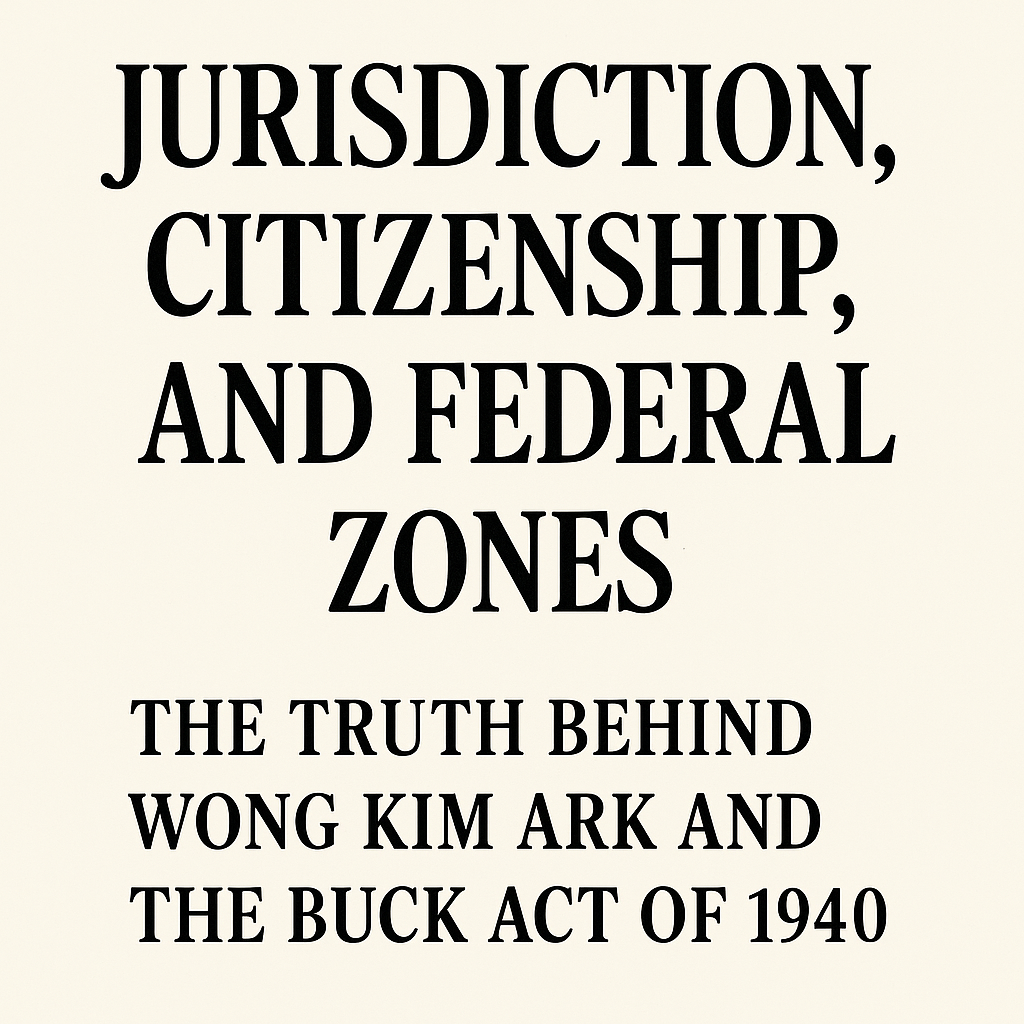This article explores the crucial legal distinctions between a State Citizen and a U.S. citizen (14th Amendment subject) by analyzing the Supreme Court case Wong Kim Ark v. United States and the jurisdictional implications of the Buck Act of 1940. It reveals how federal jurisdiction is not based on geography, but on consent and contractual participation in federal benefit programs. Through detailed legal reasoning, it explains how one can owe allegiance to the United States as a constitutional Republic without being subject to its corporate statutory codes. The piece provides actionable remedies for rebutting federal presumptions and restoring lawful State Citizenship.
Introduction: Reclaiming Lawful Status in a Commercial World
In today’s complex legal landscape, the difference between a “State Citizen” and a “U.S. citizen” is often misunderstood or intentionally obscured. This confusion serves to keep individuals under unwarranted federal jurisdiction. To reclaim one’s lawful standing and shield oneself from administrative overreach, it’s essential to understand two critical legal foundations: the Supreme Court ruling in Wong Kim Ark v. United States (1898), and the creation of federal jurisdictional overlays via the Buck Act of 1940.
Section I: The Truth About Wong Kim Ark – Jurisdiction Is Consensual
The Wong Kim Ark case is widely used to justify birthright citizenship under the 14th Amendment. However, a careful legal analysis reveals that it affirms the doctrine that federal jurisdiction depends on full and voluntary submission—not just physical presence.
Key highlights:
- The Court held that Wong was a citizen under the 14th Amendment because his parents were permanently domiciled and subject to U.S. jurisdiction.
- The term “subject to the jurisdiction” means complete legal authority, not mere geographic location.
- This distinction preserves the concept of state Citizenship: one can be born in the United States and still not be under federal control unless they consent.
Conclusion: Wong Kim Ark reinforces that jurisdiction is not automatic—and that political allegiance does not equal legislative subjugation.
Section II: The Buck Act of 1940 – Federal Zones by Contract, Not Geography
The Buck Act (4 U.S.C. §§ 105–110) was enacted to allow federal jurisdiction within the 50 states—but only under specific legal and contractual conditions. It gave the U.S. government tools to enforce tax and regulatory codes in “federal areas”—not by seizing land, but by attaching jurisdiction to individuals based on federal benefit usage.
What qualifies as a “federal area”?
- Military installations, post offices, and federal buildings
- Land ceded by States through contract
- Any area where an individual uses a ZIP Code, files federal tax forms, or accepts federal benefits
Conclusion: The Buck Act created federal overlays on State land by extending jurisdiction to people, not places—triggered by contracts and benefit usage.
Section III: State Citizenship and National Allegiance Without Federal Subjection
A state Citizen is a natural man or woman born on the land of a sovereign State who owes allegiance to the original Republic—not to the municipal corporate entity known as UNITED STATES, INC. This distinction matters because:
- A national owes loyalty to the Constitutional United States, not to the corporate federal government.
- A State Citizen is not a subject unless they voluntarily enter federal jurisdiction.
- Federal laws and taxes only apply through consensual adhesion contracts.
Conclusion: Allegiance to the Republic is lawful; servitude to a corporate entity is optional—and revocable.
Section IV: Lawful Remedies to Rebut Federal Jurisdiction and Presumptions
To correct one’s status and cancel presumed contracts with the federal jurisdiction, several lawful remedies and tools are available:
- UCC 1-308: Reservation of rights without prejudice
- Affidavit of Status Correction: Rebutting the presumption of federal citizenship
- Revocation of Election: Under 26 CFR 1.871-1(a), to cancel voluntary taxpayer status
- Affidavit of Non-Domicile: To reject residence in a federal area under the Buck Act
These tools are rooted in contract law and constitutional protections, allowing living men and women to withdraw from unauthorized obligations.
Conclusion: Contracts are reversible, and jurisdictional presumptions are rebuttable when lawfully challenged.
Conclusion: Understanding Status Is the Foundation of Freedom
The distinction between a State Citizen/National and a U.S. citizen (14th Amendment subject) has far-reaching legal consequences. The Supreme Court in Wong Kim Ark confirmed that jurisdiction must be total and consensual, and the Buck Act demonstrated that federal power operates via presumption and contract—not geography.
To remain sovereign and lawfully free, one must:
- Understand how jurisdiction is acquired,
- Identify the contracts or benefits creating legal bindings,
- Rebut unauthorized presumptions,
- And stand firmly in their rightful private capacity.
By reclaiming one’s lawful status and rebutting false jurisdiction, you reassert your position as one of We the People—the source of all legitimate government power.




